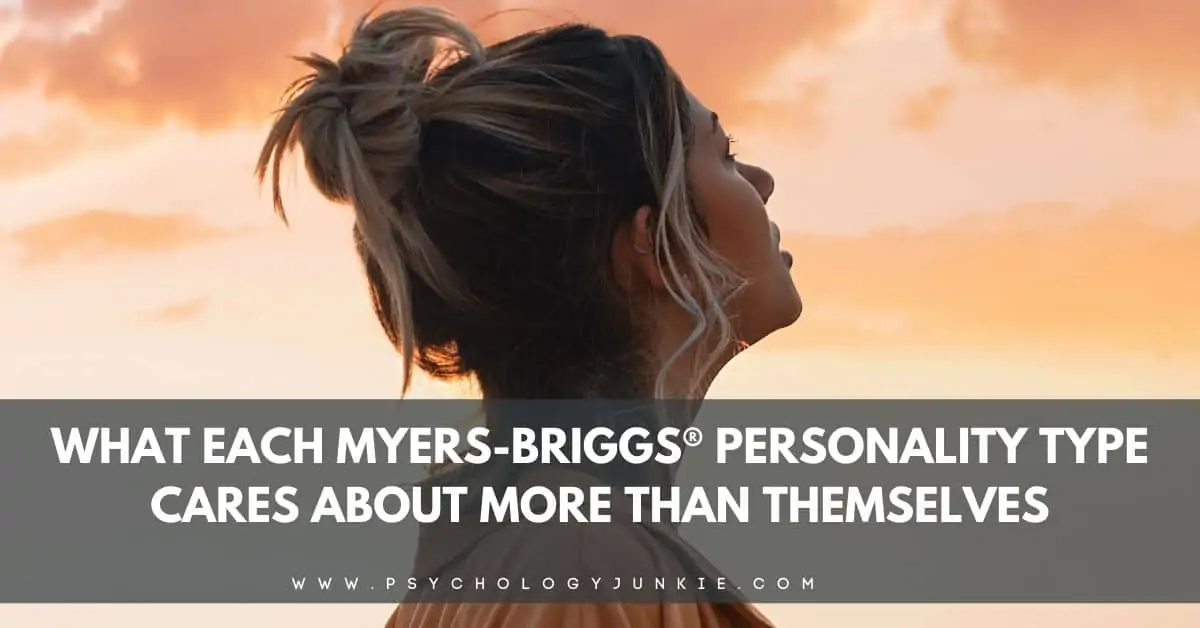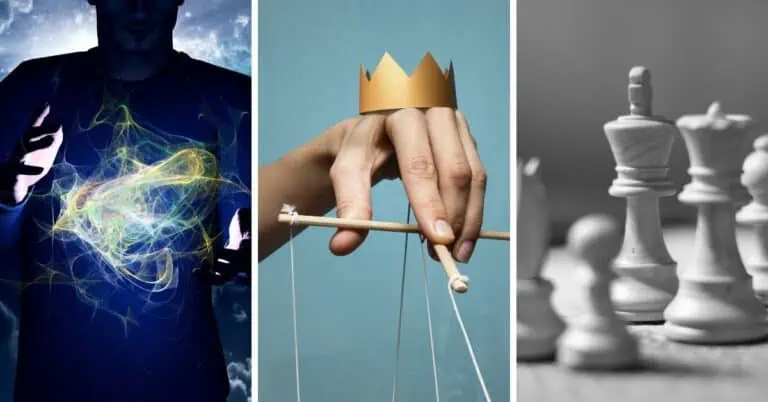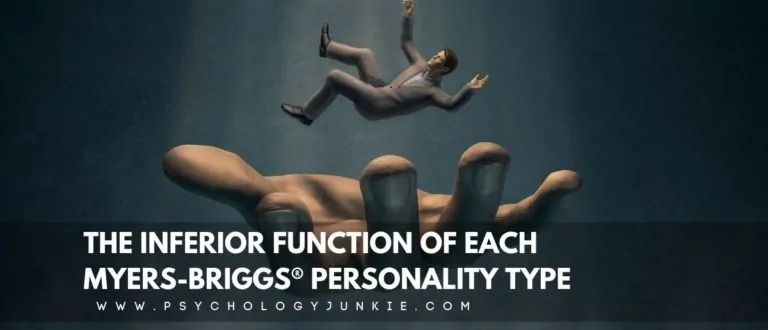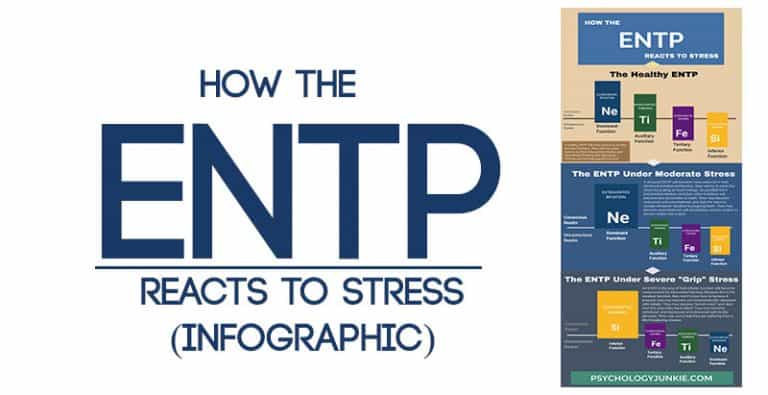What Each Myers-Briggs® Personality Type Cares About More Than Themselves
Every one of us, no matter our personality type, has a value or belief that matters more to us than our own desires. For some it’s freedom, for others it’s a sense of duty and responsibility. In today’s article we’re taking a look at the things that each type prizes more than themselves. As always, be sure to leave a comment if you have any thoughts or insights!
Not sure what your personality type is? Take our new personality questionnaire here. Or you can take the official MBTI® here.

Table of contents
- The ENFP – The Power of Imagination
- The ENTP – Innovation
- The INFP – The Value of the Soul
- The INTP – Truth
- The ENFJ – Human Empathy & Understanding
- The ENTJ – Individual Power
- The INFJ – Individual Purpose
- The INTJ – Understanding
- The ESFP – Freedom
- The ESTP – Opportunities
- The ISFP – Authenticity
- The ISTP – Autonomy
- The ESFJ – Community
- The ESTJ – Responsibility
- The ISFJ – Security
- The ISTJ – Loyalty
Estimated reading time: 11 minutes
The ENFP – The Power of Imagination
If you try to trap an ENFP or limit them in any way, they will find some way to unshackle their mind and fight back with the power of imagination. ENFPs are driven to use their creativity and intuition to make a difference in the world. They want to find ways to help others and make the world a better place. Imagination gives them freedom, possibilities, and the power to dream up new ways to evolve and experience life. No earthly thing can cage them when their imagination is allowed to be free.
“I believe in the power of the imagination to remake the world, to release the truth within us, to hold back the night, to transcend death, to charm motorways, to ingratiate ourselves with birds, to enlist the confidences of madmen.” – J.G. Ballard
Read This Next: A Look at the ENFP Leader
The ENTP – Innovation
ENTPs are always looking for new opportunities to learn and grow. They are excited by change, challenges, and the promise and potential of the untrodden path. They want to be able to see the world from as many different perspectives as possible and they believe that this is the key to understanding it. Their thirst for knowledge drives them to search for new ways to improve themselves and the world around them. They are natural inventors and problem-solvers who can see potential in anything.
“The only way to discover the limits of the possible is to go beyond them into the impossible.” – Arthur C. Clarke
Read This Next: 12 Amazing Fictional ENTP Characters
The INFP – The Value of the Soul
INFPs see beyond surface-level appearances and pursuits and to the inherent value of each individual’s soul and spirit. They know there’s more to life than job promotions, fashions, money, and ego-driven ambitions. Embodying their soul’s purpose is what brings meaning and happiness to an INFP’s life. They are often driven to help others find their own purpose in life and see the beauty and potential in them that they may not have been able to see themselves.
“Whatever you are physically…male or female, strong or weak, ill or healthy–all those things matter less than what your heart contains. If you have the soul of a warrior, you are a warrior. All those other things, they are the glass that contains the lamp, but you are the light inside.” – Cassandra Clare
Read This Next: 24 Signs That You’re an INFP, the Dreamer Personality Type
The INTP – Truth
INTPs are driven to understand truth and the nature of reality. Historically speaking, they are the types of people who would sacrifice their lives to defend truth – even if it went against public opinion, tradition, or laws. They enjoy exploring ideas, theories, and possibilities that have yet to be discovered. INTPs live in the world of theoretical possibilities and want to know everything about how things work from the ground up. They care little for surface knowledge or appearances and instead focus on what aligns with their logical principles.
“Above all, don’t lie to yourself. The man who lies to himself and listens to his own lie comes to a point that he cannot distinguish the truth within him, or around him, and so loses all respect for himself and for others. And having no respect he ceases to love.” – Fyodor Dostoevsky
Read This Next: 24 Signs That You’re an INTP, the Prodigy Personality Type
The ENFJ – Human Empathy & Understanding
ENFJs will work tirelessly to forge understanding and unity in the world. They often see where two warring sides can agree and will do anything to dissolve damaging conflicts that are unnecessary and harmful. Idealistic and visionary, they believe they can make the world a better place by understanding people and helping them to see their commonalities. Martin Luther King Jr. was an ENFJ, and he spent his life devoted to creating equality and helping people to see that they have more in common than they think. ENFJs believe that a world full of empathy and understanding is possible, and they will work tirelessly to make it a reality.
“Love is the only force capable of transforming an enemy into friend.” – Martin Luther King Jr.
The ENTJ – Individual Power
Drive and strategic vision propel the ENTJ to new heights of progress and potential. More than anything, ENTJs believe in the power of the individual to overcome insurmountable odds. There is always a way to succeed; no matter the external limits and dangers. They will go down swinging to protect individual freedoms and the right to pursue one’s ambitions, passions, and dreams. With enough steeliness, determination, and insight, they truly believe anything is possible.
“And once the storm is over, you won’t remember how you made it through, how you managed to survive. You won’t even be sure whether the storm is really over. But one thing is certain. When you come out of the storm, you won’t be the same person who walked in. That’s what this storm’s all about.” – Haruki Murakami
The INFJ – Individual Purpose
To the INFJ, every individual has the potential to change the world. Nobody is insignificant or small. Nobody should be discarded, regardless of their education level, wealth, or physical appearance. Often drawn towards careers in counseling, INFJs are known for their ability to propel people towards a higher calling. They do not believe in a world where there has to be a loser or a winner, but rather one where everyone is afforded the same opportunities to achieve their fullest potential. Their sense of purpose drives them to seek out meaning in life and to help others find their own sense of purpose. They want to make a difference in the world and will sacrifice their time and energy to help people find their calling and believe in themselves.
“He who has a why to live for can bear almost any how.” ― Friedrich Nietzsche
Read This Next: 7 Things That INFJs Experience As Children
The INTJ – Understanding
For the INTJ, nothing is worse than limits imposed upon the mind. A life without questions, mysteries, and the freedom to pursue truth is not a life worth living. INTJs see themselves as the detectives of the world. They are always trying to see how things connect, to understand the “why’s” of the universe, and peel back the layers of complexity to get to the heart of the matter. They are driven by an insatiable curiosity and desire to understand the truths that others often take for granted or ignore. To the INTJ, there is no greater joy than understanding something that others have never grasped.
“All that was great in the past was ridiculed, condemned, combated, suppressed — only to emerge all the more powerfully, all the more triumphantly from the struggle.” ― Nikola Tesla (an INTJ)
Read This Next: The Top 7 Gift Ideas for INTJs
The ESFP – Freedom
The thrill of adventure and the joy of possibility are what ESFPs live for. They hate nothing more than rules that restrict individuality and confine the human spirit. Bureaucracies and corrupt governments are the sworn enemies of the ESFP. They will fight against any power structure that is persecuting or entrapping people with unjust rules or limits. ESFPs have a strong sense of fairness and will often stand up for the oppressed and underprivileged no matter what the cost. They believe in living life to the fullest and embracing every moment with passion and abandon.
“The only way to deal with an unfree world is to become so absolutely free that your very existence is an act of rebellion.” –Albert Camus
The ESTP – Opportunities
ESTPs are known as the daredevils of the type community, but there’s more to their heart than a desire for thrills and excitement. ESTPs want to live in a world where there are no limits on what people can do or become. They believe that every person has the potential for greatness and should be given the opportunity to achieve it. Determined and dauntless, they will jump at any chance to challenge themselves or test their limits. They will also fight against rules or limits that diminish individual freedoms or restrict opportunities.
“Those who deny freedom to others do not deserve it for themselves.” – Abraham Lincoln
The ISFP – Authenticity
Nothing is worse to the ISFP than being forced to be something they are not. They care more about the individual’s right to self-expression and honesty than they care about their own happiness. Sometimes being authentic means sitting with uncomfortable feelings. The ISFP will put up with a lot of pain if it means being true to themselves and the people they care about. In fact, feeling any sort of discomfort might drive them to be creative or inventive in order to change the situation for the better.
“If nothing else in this long and short life, let me be true to my conscience, to the dignity of my own heart. Let me act in a way that says, I have honored my spirit as truly as I have honored others’. Let me stand tall and rooted as a mountain in the face of a quaking world.” – Jennifer DeLucy
The ISTP – Autonomy
ISTPs are determined to discover hidden truths, pursue freedom, and experience the dazzling wonder of the world around them. They don’t want to be told how to do something, nor do they want rules or limits on their goals. They must have the space and freedom to pursue independence in a rational way that aligns with their principles. A world that restricts their autonomy and independence is one they will fight against with all their might.
“He who gives his freedom for safety gets none of them.” – Thomas Jefferson
The ESFJ – Community
ESFJs will go down with the ship in order to protect the people they love. Helping out in their communities, giving time in service of their families, or just being there for other people are what they value most. They hate seeing other people suffering and will do their best to ease it or comfort others in any way possible. ESFJs have a deep need to belong to something bigger than themselves, no matter the cost.
“The purpose of life is not to be happy. It is to be useful, to be honorable, to be compassionate, to have it make some difference that you have lived and lived well.” ― Ralph Waldo Emerson
The ESTJ – Responsibility
ESTJs are the backbone of society. They care most about fulfilling their responsibilities to their families, communities, and the world at large. They want to create stability and order in the world so that people can live peacefully and productively. ESTJs have a strong sense of duty and are often attracted to jobs or roles that allow them to take charge and lead others. They hold themselves to high standards and expect the same from other people.
“Character — the willingness to accept responsibility for one’s own life — is the source from which self-respect springs.” – Joan Didion
The ISFJ – Security
People with the ISFJ personality type consider it their duty to protect and care for those they love. They have a heart for the struggling people of the world and will often do whatever it takes to provide a safe, stable environment for people who need them. They may find themselves taking on many roles or responsibilities in order to tend to the well-being of their children, communities, and loved ones. ISFJs are often attracted to careers in the healthcare field or as educators because they want to help people live fulfilling, secure, tranquil lives.
“Do your little bit of good where you are; it’s those little bits of good put together that overwhelm the world.” ― Desmond Tutu
Read This Next: 10 Characteristics of the ISFJ Child
The ISTJ – Loyalty
ISTJs believe in standing up for what they believe in and upholding the values that they trust. They will stay committed to people and projects they care about for a lifetime if need be. Having a sense of honor and duty toward the greater good is crucial to them. Knowing the difference between right and wrong and fulfilling one’s responsibilities is of the highest priority to them. If an ISTJ promises to do something, you can count on them to keep their word (unless they’re at an unhealthy level of maturity).
“We men and women are all in the same boat, upon a stormy sea. We owe to each other a terrible and tragic loyalty.” ― G.K. Chesterton
What Are Your Thoughts?
Did you enjoy this article? Do you have any thoughts or insights to add? Let us know in the comments
Find out more about your personality type in our eBooks, Discovering You: Unlocking the Power of Personality Type, The INFJ – Understanding the Mystic, The INTJ – Understanding the Strategist, and The INFP – Understanding the Dreamer. You can also connect with me via Facebook, Instagram, or Twitter!








Great post! Well written and great info.
It has been my experience that each type’s associated value they hold dear, is heavily attached to their EGO. I have seen each type go against that which they care about more than themselves if they feel like that image of themselves has been momentarily compromised (by themselves).
Example, the ESTJ, whose fast held image of themselves as a responsible person, may do something to cover up that momentary blemish and then actually lie to preserve to others that responsible image.
The INTP, who values accuracy and truth, will be inclined to lie rather than admit they got something wrong or didn’t know some fact or information.
The ISTJ will ghost someone they (the ISTJ) hurt, being unwilling to face the fact that what they did to that other person makes them (the ISTJ) look like they aren’t a very loyal friend.
The list goes on but I do observe each of us doing what needs to be done to protect our EGO when we have ‘failed’ the image we have of ourselves.
I agree! I know a few ISTJs who never like to admit they were wrong or say sorry. They’d rather just ghost/ignore the person.
As an intj, freedom is most important, like health, if you don’t have it, nothing else matters.
Carol’s comment above is so true!
For many years I had a best friend who was an INTP. (I am an INTJ) I moved away from my friend and his city for life change reasons but kept in touch with him because I greatly respected his honesty and integrity which were exceptional.
Then at some point after 2020 we got into a disagreement over Covid and the Covid vaccine issue. I had sent him an article about Senator Ron Johnson’s convened committee of medical doctors and PhD’s to discuss the pros and cons of the Covid vaccines. (Senator Johnson is a conservative Republican and neither my friend nor I are politically conservative.) I simply wanted to bring my friend’s attention to what some medical professionals were saying about the Covid vaccine — and it wasn’t all good. My friend who had accepted the vaccine on his doctor’s recommendation attacked the presenters at Senator Johnson’s panel in an ad hominum attack which greatly surprised me as being sophomoric and beneath his usual cool and rational objectivity. We’ve since stopped communicating and I’ve broken off all contact with him shocked that my friend had succumbed to irrationality. Perhaps because this issue had affected him personally. He had taken the shot and he didn’t like or was afraid to contemplate the idea (as put forward by several medical professionals with MD’s and PhDs) that these Covid vaccines may not have been completely innocuous and may have in fact been, in some ways harmful. To me that was comparable to a child putting his fingers in his ears because he doesn’t want to hear some bad or unpleasant news. Very childish.
I know how you feel about that issue. Many people are so determined to believe the authorities and mainstream narrative that they refuse to consider that those sources aren’t as trustworthy as they’ve been led to believe, or admit that they made a mistake. It’s surprising to me though that one of those people would be an INTP. In my experience, INTPs are the most open minded type. Are you sure your friend isn’t an ISTP?
P.S. Ron Johnson rules!
Thanks for defending INTPs 😂
I think every type is able of everything… it might depend on how healthy they are.
But I agree that INTP might not be the first to fall for what the government wants us to believe.
I did take the vaccine shots because I needed to travel and it made it easier, but I knew it was not necessarily safe, I absolutely didn’t trust them telling me it was safe.
What I don’t trust the government about these days is the trans issue. But I’ve seen all kinds of people fall for it because of virtue-signalling and other emotions, like misplaced empathy, forgetting all together to check what it does to women and children, while the facts are there.
As an INTP… I agree so much, and that’s why the trans activism infuriates me so much. It’s based on lies and narcissism. I spent years studying the different aspects, I never found anyone able to justify what it’s like to feel like a woman, outside of sexist stéréotypes. So they don’t debate, they use cult and authoritarian techniques to get their way.
As an INTP…… I’m not impressed.
As an 8, I’m furious about what they’re doing to women and children.
I agree with you on that. It seems like the trans issue might be the one thing to get democrats to open their eyes to how far they have gone off the deep end. I know a lot of people who voted for Biden but are not at all in favor of the trans stuff being pushed.
I have a novel to recommend you on the trans topic that you might be interested in: Being Gilbert by Gail O. Dellslee. It highlights the way transgenderism is more a social contagion than being one’s true self, and how when one transitions to the other gender, they are conforming to a stereotype.